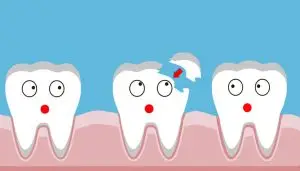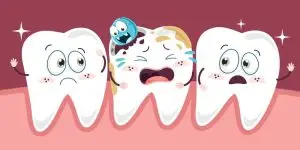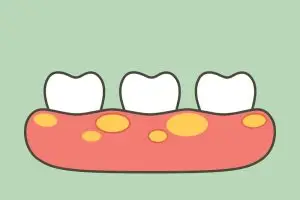Oral health is important, but it’s often underrated, which leads to oral disease. Untreated tooth decay affects 44% of the world’s population. Oral disease affects nearly 3.9 billion people around the world, with periodontal disease affecting 15-20% of adults. When untreated oral health issues are ignored for long enough, they can lead to more serious and painful dental emergencies.
Timely dental care does matter particularly with the most serious dental emergencies. Here are the top five dental emergencies and what we can do about them.
Chipped, Cracked, or Fractured Tooth
 A chipped or cracked tooth is one of the most common dental emergencies. Something as simple as a sports injury, a falling accident, or other unexpected dental trauma in Phoenix can damage your tooth. Here are some tips that might help you until you can see a dentist.
A chipped or cracked tooth is one of the most common dental emergencies. Something as simple as a sports injury, a falling accident, or other unexpected dental trauma in Phoenix can damage your tooth. Here are some tips that might help you until you can see a dentist.
- Use temporary filling material or wax from your local store.
- Avoid using the affected area of the mouth.
- Don’t eat or drink hot or cold foods or drinks, because your tooth may be sensitive.
When you go in to see a dentist, treatment may include veneer, tooth bonding, a crown, or a root canal depending on the severity of the issue and how long you’ve waited to get the tooth fixed. For more severe cases, consider Mesa cracked tooth repair services to restore strength and prevent further damage.
Missing or Loose Tooth
If an injury or accident is severe enough, your tooth may have been loosened or knocked out. If trauma is not the cause, a loose tooth may be a sign of poor oral hygiene, gum disease, or damage caused by grinding or clenching your teeth.
While not every cause can be avoided, you can wear a mouth guard for grinding teeth and practice good oral hygiene. Here are some tips that might help you until you can see a dentist.
- Don’t wiggle or try to pull the tooth yourself.
- Avoid using the affected area of the mouth.
- Gargle with salt water to keep the area clean.
- Use an ice pack to help with the swelling if associated with an injury.
When you go in to see a dentist for a missing or loose tooth, the treatment might involve partial dentures, dental implants in Mesa, or dental bridges.
Tooth Pain
 Tooth pain can indicate a whole range of serious dental emergencies, including infection, a broken tooth, a damaged filling, or a tooth abscess.
Tooth pain can indicate a whole range of serious dental emergencies, including infection, a broken tooth, a damaged filling, or a tooth abscess.
- As an at-home remedy, you can try a saltwater rinse.
- Apply an ice pack to help with the swelling and pain.
- Take over-the-counter pain relievers like acetaminophen or pain-relieving gel as recommended to relieve pain. Clove oil is another home remedy.
If the pain is severe and/or worsening for 24+ hours, particularly if it’s combined with a fever, seek out a dentist. The treatment in Phoenix or Mesa will vary depending on the cause for the tooth pain, but it could involve antibiotics, extraction, or a root canal.
Lost Crown or Filling
When you lose your filling or crown, get it fixed right away to avoid more serious dental emergencies.
- As a stopgap solution, you can use temporary filling material or wax to temporarily replace the hole in your tooth. It might also help with pain and discomfort.
- If you still have the crown, you can use over-the-counter cement or petroleum jelly to keep the crown in place.
- Avoid using the tooth so that the temporary fix has a chance to work.
- Gargle with salt water to keep the area clean and free of debris.
If you act quickly enough, the dentist may be able to cement the crown back in place without further issue. Depending on what the dentist’s exam and x-rays show, the dentist may need to extract the tooth or perform a root canal.
Abscess
 Sudden swelling in your face and lymph nodes or painful irritation in your mouth and jaw may mean that you have an abscess, a bacterial infection at the tip of the root in your tooth, or in your gum. Other symptoms could include throbbing pain, sensitivity to temperature, pain when chewing, fever, and difficulty breathing. Here are some tips that might help with the pain and swelling.
Sudden swelling in your face and lymph nodes or painful irritation in your mouth and jaw may mean that you have an abscess, a bacterial infection at the tip of the root in your tooth, or in your gum. Other symptoms could include throbbing pain, sensitivity to temperature, pain when chewing, fever, and difficulty breathing. Here are some tips that might help with the pain and swelling.
- Gargle with saltwater.
- Avoid eating hot or cold foods or drinks.
- Take over-the-counter pain relievers like acetaminophen or pain-relieving gel as recommended.
- Use a baking soda (1/2 tablespoon mixed with water) solution to swish around your mouth. It has antibacterial properties.
- Use fenugreek tea to help with the inflammation. Swish lukewarm tea in your mouth or apply with a cotton swab or ball to the affected area.
- Use an ice pack to help with swelling and pain.
While at-home remedies can help to temporarily numb the pain and address the other symptoms, a dentist is the best person to determine what needs to be done for your abscess. Left untreated, an abscess is a bacterial infection that can lead to potentially life-threatening side-effects. If you can’t get an appointment to see a dentist in Mesa or Phoenix right away, seek emergency medical help, particularly if the severe pain and high fever continue for longer than 24 hours.
Conclusion
Dental emergencies happen, so it’s best to be prepared with immediate access to a dentist who can quickly resolve your emergency. Time does make a difference particularly in cases of injury or trauma. If a dentist can act right away, they may be able to save your tooth, but it also can help prevent a long-and-painful waiting period and other, more serious complications. Need a dentist who can help you in an emergency? Contact us at Dental Brothers today!
